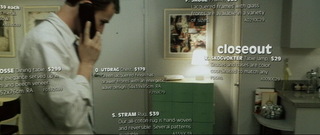 Back to selection
Back to selection
DEPRESSED ABOUT FIGHT CLUB

At the Scanners blog, Jim Emerson has a great look back at David Fincher’s Fight Club, viewing it through the personal lens of depression.
An excerpt:
One of the (many) reasons I probably connect so strongly with David Fincher’s “Fight Club” (1999) is that, by capturing clinical depression more accurately than any other movie I’ve ever seen (though Laurent Cantet’s “Time Out” and Eric Steel’s “The Bridge” delve mighty deep into that abyss), it helped shake me out of the grips of a depression that was sucking me down at the time. I was the only person in the theater convulsed with laughter from beginning to end, because it was liberating, exhilarating, to see the truth of my own inner experience reflected back at me in its funhouse mirror. I recognized myself in the movie, relished the psychological acuteness of what I was seeing, felt its black absurdity resonate in my poor, chemically imbalanced noggin. From the very first images deep inside the human brain, I felt it could not be about anything else, even though I didn’t know where it was going to go from there.
It’s a long post that winds through a discussion of Hitchcock’s The Wrong Man, Taxi Driver, Errol Morris and Abu Ghraib, bad dreams, American Beauty, and the narcissistic essence of macho. Recommended.
